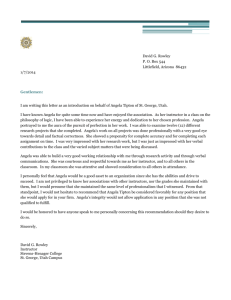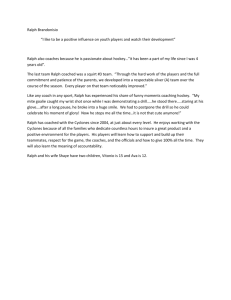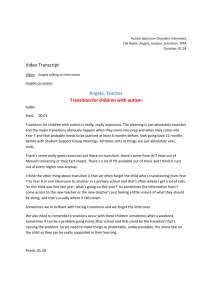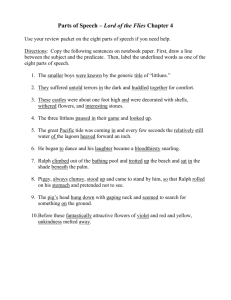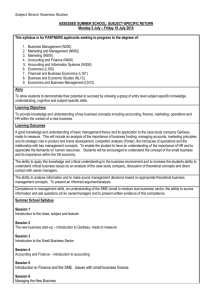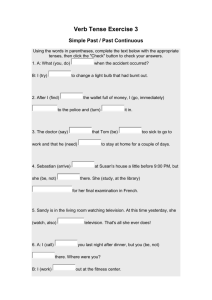Scenario #1: Office Romance: Groping for Answers
advertisement
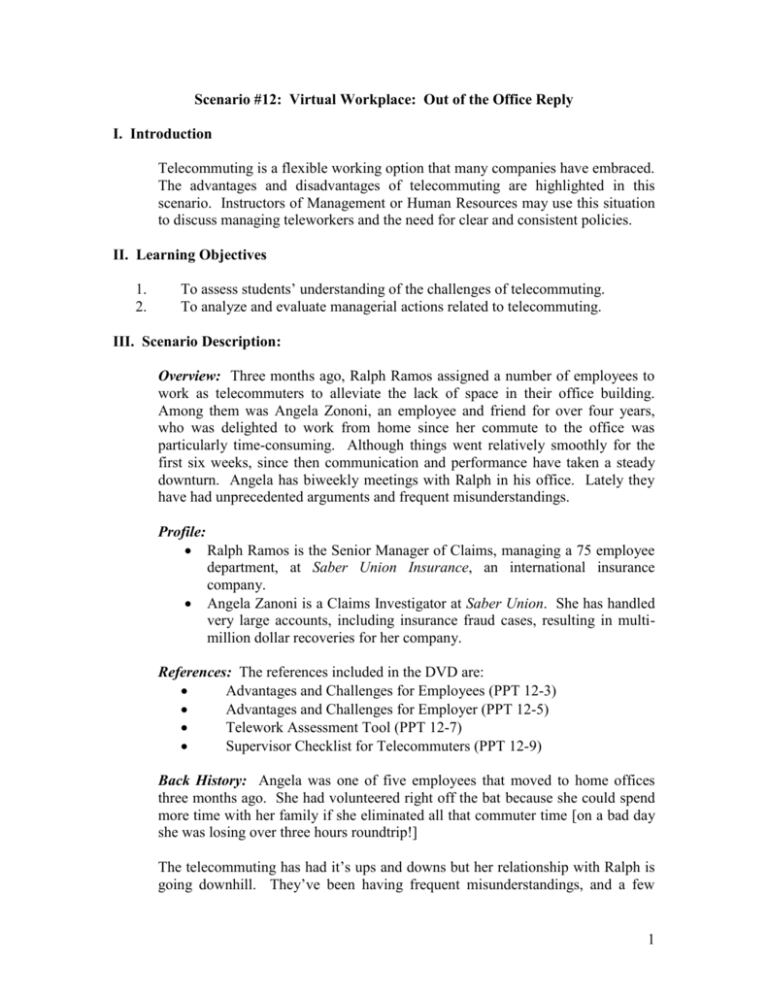
Scenario #12: Virtual Workplace: Out of the Office Reply I. Introduction Telecommuting is a flexible working option that many companies have embraced. The advantages and disadvantages of telecommuting are highlighted in this scenario. Instructors of Management or Human Resources may use this situation to discuss managing teleworkers and the need for clear and consistent policies. II. Learning Objectives 1. 2. To assess students’ understanding of the challenges of telecommuting. To analyze and evaluate managerial actions related to telecommuting. III. Scenario Description: Overview: Three months ago, Ralph Ramos assigned a number of employees to work as telecommuters to alleviate the lack of space in their office building. Among them was Angela Zononi, an employee and friend for over four years, who was delighted to work from home since her commute to the office was particularly time-consuming. Although things went relatively smoothly for the first six weeks, since then communication and performance have taken a steady downturn. Angela has biweekly meetings with Ralph in his office. Lately they have had unprecedented arguments and frequent misunderstandings. Profile: Ralph Ramos is the Senior Manager of Claims, managing a 75 employee department, at Saber Union Insurance, an international insurance company. Angela Zanoni is a Claims Investigator at Saber Union. She has handled very large accounts, including insurance fraud cases, resulting in multimillion dollar recoveries for her company. References: The references included in the DVD are: Advantages and Challenges for Employees (PPT 12-3) Advantages and Challenges for Employer (PPT 12-5) Telework Assessment Tool (PPT 12-7) Supervisor Checklist for Telecommuters (PPT 12-9) Back History: Angela was one of five employees that moved to home offices three months ago. She had volunteered right off the bat because she could spend more time with her family if she eliminated all that commuter time [on a bad day she was losing over three hours roundtrip!] The telecommuting has had it’s ups and downs but her relationship with Ralph is going downhill. They’ve been having frequent misunderstandings, and a few 1 small arguments. Angela feels that Ralph’s operating on an out of sight out of mind mentality. He doesn’t even seem to read the email reports very closely. They do meet every two weeks at the office as a check-in but it’s a pure formality. To make matters worse, a colleague who works in the office told her about all the high stakes claims another investigator, Bob, has been working on. Angela hasn’t had anything ‘hot’ in weeks. Ralph is happy with the way things are working out. The office is no longer overcrowded or disturbingly noisy. The telecommuters are doing their work and reporting regularly. He is having more trouble staying on top of their reports and their projects but that’s probably because he’s so busy. Scene Set-up: Ralph and Angela are meeting to discuss their recent miscommunications and Angela reveals her dissatisfaction with her recent treatment. Scene Location: Ralph’s Office The Meeting - Summary: Ralph brings up the missed deadline and Angela says she was not informed that the deadline had been moved. Ralph explains how the information was conveyed. She says she feels that she is out of sight, out of mind and that since she began telecommuting it has hurt her career. She notes that Bob has received more high-stakes claims than her recently. Ralph explains that assignments to employees are based on their talents and experience and that Bob had experience with one client which is why he chose him. Ralph says he didn’t realize she was feeling this way and wasn’t prepared. He suggests they meet later. Two weeks later – Angela misses an appointment with Ralph and deliberately fails to provide work on time. Ralph wants to understand what has happened to change the good working relationship they had. Angela threatens to resign, but Ralph maintains his composure and urges her to try to work out a solution with him. They decide that for the next two weeks they will talk on the phone everyday. Then, they will decide if Angela should come back to the office rather than telecommute. Afterthoughts – Summary: Ralph states his strategy was to listen to Angela. He notes that he often has issues with people working from home because it’s difficult to keep track of what is going on. He feels voicemail and email are impersonal. He drafts written plans with employees who want to work from home that outlines goals. The plans are executed on a temporary basis until it is clear that they will work and then he gives final approval. Dossier: The specific artifacts included in the DVD are: 1. Emails between Ramos and Zanoni 2. Voicemail from Sorento to Zanoni 2 3. Ramos’ Assistant’s Voicemails to Zanoni IV. Discussion Questions: The References and related Discussion Questions may be found in PowerPoint slides 121 to 12-9. Learning Objective #1: To assess students’ understanding of the challenges of telecommuting. 1. What advantages and disadvantages to telecommuting is Angela experiencing? See PPT 12-3. Angela enjoys not having to commute and likes to be closer and more available for her family. The voicemail from her friend indicates that she may be losing the personal relationships she enjoyed at work because of decreased interaction. She clearly feels left out of certain decisions and is concerned her career may be impeded. 1. How should Ralph respond [when Angela says “since I’ve been working from home, I’m out of sight”]? A. Compassionately B. Clarify issues C. Debate point Ralph attempts to clarify the issues to calm Angela down. 2. What advantages and disadvantages to managing a telecommuter is Ralph experiencing? See PPT 12-5. His intention was to improve moral and job satisfaction of Angela by cutting down her commuting time. In actuality, the opposite result has occurred. He blames this on the difficulty coordinating and controlling staff and monitoring their performance. He is clearly frustrated by not being able to reach Angela readily when important work-related matters arise. 2. What is Ralph’s strategy? A. Emphasize strengths B. Hide biases C. Change topic Ralph tries to emphasize Angela’s strengths and explains that Bob was chosen for the higher stakes assignment because of is past experience, not because he is in the office more regularly. 3. How was this [initial] meeting? 3 A. Successful B. A failure C. A good start It appeared that the meeting was a good start, but Angela’s actions in between the two meetings indicates that she is very upset and feels discriminated against because of her working arrangement. Learning Objective #2: telecommuting. To analyze and evaluate managerial actions related to 1. What should Angela have done to prepare herself for telework? Refer to PPT 127. Angela needed to really assess whether her work style was suited for telecommuting. While there are obvious advantages (shorter commute time), there are some less obvious disadvantages. One needs to assess themselves on the degree that the reality of telework will impact them. The questions found in PPT 12-7 would be a good start in this assessment. 4. Angela is dejected. Ralph should focus on: A. Her value B. Her poor performance C. His mistakes Ralph should help Angela realize her value to the organization and explain that he did not intend to make her feel left out. 2. What should Ralph have done to prevent this problem from occurring? Refer to PPT 12-9. Completing the Checklist provided in the slide would be effective. Specifically, for their situation, a more formalized communication process needs to be created. 5. What should Ralph do [when Angela says she want to resign]? A. Accept resignation B. Try new approach C. End meeting Because Angela is a valuable and long-time employee he should try a new approach with her to urge her to work out this problem. 6. What’s Ralph’s next step? A. Find replacement 4 B. Communication often C. Reassign work load Ralph’s next step is to communicate more frequently with Angela to see if performance improves and if the telecommuting arrangement will work in the future. 5

